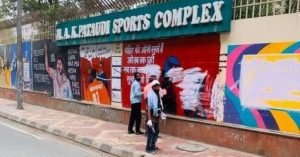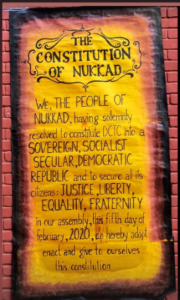Kurtas with daphlis in their hands, beats of djembe, the brilliance of subtly presenting an issue, without pressing on their opinion to lay the conflict bare with sarcastic dialogues and their skills. This is Delhi Collegiate Theatre Circuit (DCTC) in a nutshell. But it’s a lot more beyond those plays and lightings.
From deciding the correct form and structure of the play, transitions between scenes, on-point research and rigorous practices, there are various problems faced by Drama societies.
A prominent criticism that is hailed against college societies is that they often give in to the demands of competitions and fail in igniting a conversation among the audience. In the quest of making plays more appealing to the audience and making them aesthetic, the plays usually land in between. Far fetched metaphors and references at times might not engage the audience but the teams make sure they strike the chord with not just the crowd on campus but also with the common public.
To Question or Not to Question?
A major role played by art is to make people wonder and question. But what if art loses its ability to be loud, or what if it is forced to give up its strength of astonishing its audience. Various examples of art being censored can be found in every age under every regime. The most recent example that comes to mind was when even after CAA protestors left the protest site, just the wall paintings and graffiti remained there with words of Faiz, Manto and Pash speaking the truth. Those paintings were defaced and removed because Art alone holds the bravado of being loud and piercing.

There are numerous problems that await the circuit on the ground.
“All activities in art and literature have to be anti-establishment to gain contemporary relevance”
– Habib Tanvir
Dramsocs have always employed political satire in their plays. Street plays are almost always a form of dissent. In the age of growing intolerance, it will be interesting to see if the sound of daphli will still echo against hegemonic institutions or it will be reduced to a mere instrument of play.

Dissent in a lot of ways has been curbed in recent times. Professors have also resigned from esteemed institutions stating ‘political liability’. With an ideological hegemony prevailing, will the voice of dissent still be heard when the colleges start? When International celebrities are being harassed for simply stating their opinion, it is worth pondering upon if drama and theatre will be able to reflect truth among the red walls.
A Tanishq advertisement, which showed the establishment of harmony and love between two communities had to face hatred and was ultimately pulled down. How will the songs of DUTC, where singers say the name of ‘Ram’ and ‘Allah’ almost in the same breath, be enjoyed?
Dissent on Campus
There have already been instances of plays being interrupted. On being questioned, several members of the circuit shared their experiences. A member of Kshitij, Gargi College told,
“We have been interrupted twice and have been scared to death while performing, but are keen on performing the same. We had a radical topic and we were prepared, keeping in mind the political scenario.”
In 2015, SGTB Khalsa had to postpone its street play competition under the allegations that its script contained anti-national elements. In 2017, four street play performances were cancelled at Mukhatib, the fest of Ramjas college. The reasons given were that these plays touched on sensitive topics, but isn’t that the whole point of street play?
Looking back at his journey, alumni of Natuve, drama society of Shaheed Bhagat Singh College said,
“Our play, Thoda Dard Hi Sahi (2016-17) contained some explicit content. We were once stopped in the middle of a performance because the judges found it outrageous but later on, after a discussion, we were allowed to finish our performance.”
In times when tweeting about something can bring you the tag of anti-national and even land you behind bars under draconian laws such as UAPA and sedition, this is a good time to think what would have happened if some brilliant plays by the theatre circuit would have been performed now. Concern about the safety of performers becomes genuine in such scenarios. Plays that talked about sensitive issues with political satire, Saare Jahan Se Achha by Ibtida, Hindu College and God Promise by DTU’s Pratibimb being some of many such.
Questions about censorship and freedom of expression need to be asked frequently but that’s the current state that questioning the hegemony has become the biggest crime one can commit. The current state is also the appropriate time to ask, “Mere khwabo ka Desh hai Kahan?” This World’s Theatre Day let’s question if the sound of Halla Bol, as a cry of dissent will still be heard or not?
Feedback from a member of the DCTC holds some hope to count upon, “If the circuit has solidarity, no one can harm us.”
